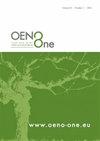A comparative study on training systems and vine density in Santorini Island: Physiological, microclimate, yield and quality attributes
IF 2.2
3区 农林科学
Q3 FOOD SCIENCE & TECHNOLOGY
引用次数: 1
Abstract
The Mediterranean basin is regarded as one of the most affected global regions by climate change. Traditionally, viticulture in this region copes with high temperatures, heat waves and drought. Such extreme conditions are expected to intensify due to climate change in the future. Our study focuses on the viticulture of Santorini Island, located in South Aegean (Greece). Local varieties trained with the traditional ‘Kouloura’ training system have been cultivated for thousands of years on the island, producing recognised high-quality PDO wines worldwide. The literature on these traditional training systems is scarce, and their investigation could aid in the adaptation of viticulture to hotter and drier future climatic conditions. The objective of this study was to compare the physiological and agronomic response of Assyrtiko grapevines to the traditional training systems ‘Kouloura’ and VSP training system over two growing seasons and to establish the factors influencing the performance of each system in the semi-arid conditions of Santorini Island. In brief, the ‘Kouloura’ training system maintained a less-stressed water status compared to VSP, while for both studied years during ‘Kouloura’ exhibited significantly higher photosynthetic rates and stomatal conductance. Regarding microclimate observations, we found that, especially during heatwaves, VSP’s grapes were more exposed to higher temperatures during midday than ‘Kouloura’ and that the ‘Kouloura’ system protected against damage from heatwaves and strong winds when compared to VSP. Investigating the mechanisms by which these traditional training systems are adapted to hot, dry climatic conditions creates applicable knowledge for developing and using alternative training systems in similar environments to adapt to climate change.圣托里尼岛栽培系统和葡萄密度的比较研究:生理、小气候、产量和品质属性
地中海盆地被认为是受气候变化影响最大的全球地区之一。传统上,该地区的葡萄栽培会应对高温、热浪和干旱。由于未来的气候变化,这种极端情况预计会加剧。我们的研究集中在圣托里尼岛的葡萄栽培,位于南爱琴海(希腊)。通过传统的“Kouroura”培训系统培训的当地品种在岛上已经种植了数千年,生产出了全球公认的高质量PDO葡萄酒。关于这些传统训练系统的文献很少,对它们的研究可能有助于葡萄栽培适应未来更热、更干燥的气候条件。本研究的目的是比较Assyrtiko葡萄藤在两个生长季节对传统训练系统“Koulura”和VSP训练系统的生理和农艺反应,并确定影响每个系统在圣托里尼岛半干旱条件下表现的因素。简言之,与VSP相比,“Kouroura”训练系统保持了较少的水分胁迫状态,而在“Kourora”期间的两个研究年份中,表现出显著较高的光合速率和气孔导度。关于小气候观测,我们发现,特别是在热浪期间,VSP的葡萄在中午比“Koulura”更容易受到高温的影响,与VSP相比,“Koulula”系统可以防止热浪和强风的破坏。研究这些传统培训系统适应炎热干燥气候条件的机制,为在类似环境中开发和使用替代培训系统以适应气候变化创造了适用的知识。
本文章由计算机程序翻译,如有差异,请以英文原文为准。
求助全文
约1分钟内获得全文
求助全文
来源期刊

OENO One
Agricultural and Biological Sciences-Food Science
CiteScore
4.40
自引率
13.80%
发文量
85
审稿时长
13 weeks
期刊介绍:
OENO One is a peer-reviewed journal that publishes original research, reviews, mini-reviews, short communications, perspectives and spotlights in the areas of viticulture, grapevine physiology, genomics and genetics, oenology, winemaking technology and processes, wine chemistry and quality, analytical chemistry, microbiology, sensory and consumer sciences, safety and health. OENO One belongs to the International Viticulture and Enology Society - IVES, an academic association dedicated to viticulture and enology.
 求助内容:
求助内容: 应助结果提醒方式:
应助结果提醒方式:


